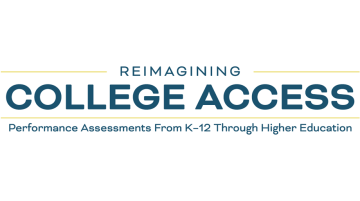Breadcrumb
RCA Newsletter: June 2021

The Reimagining College Access (RCA) initiative is a national effort to advance the use of high-quality performance assessments completed by secondary students for higher education admissions, placement, and advising decisions. The approach is intended to increase college access by expanding and deepening information about secondary students’ preparedness for higher education while deepening high school education by focusing on meaningful and rigorous work. The initiative, led by the Learning Policy Institute in collaboration with EducationCounsel, brings together a diverse group of k–12 and higher education policy and practice leaders engaged in using authentic assessments of students’ competencies and mastery of skills needed for college, work, and life in the 21st century.
This quarterly newsletter provides updates about the work of the RCA initiative, the RCA Network members, and other partners seeking to reimagine college access and success, as well as about national trends in college admissions.
Jump to: Regional Work | National News | RCA Network Research & Resources
Regional Work
On March 31, RCA held the first meeting of the Leading Places Community (LPC), a community of practice that brings together leaders of the RCA Regional Collaboratives to share promising practices and lessons learned and identify common challenges. LPC meetings also help keep the entire RCA initiative connected to the experiences and perspectives of those leading the work in the field. A total of nine leaders from the RCA California, Colorado, and New England Collaboratives provided updates about, and received feedback on, their individual work. The group also identified challenges they are facing and potential strategies for overcoming them. The information and insights generated at this first LPC meeting will inform future meetings as well as other work RCA and its partners might pursue to help the RCA Collaboratives advance work in their states and regions. The LPC will meet again this summer to further align efforts across the RCA Collaboratives.
National News
Test-Optional Admissions Yields Benefits
A new article from Inside Higher Ed summarizes finding from a paper published in the American Educational Research Journal that looks at the impact of test-optional admissions on nearly 100 private colleges that adopted their policies between 2005–06 and 2015–16. The findings associated test-optional policies with increased enrollment of Pell Grant recipients, minority students, and women. Robert Schaeffer, the executive director of FairTest: The National Center for Fair and Open Testing, points out that test-optional policies are not a “magic bullet” but can enhance equity in admissions when combined with other initiatives to remove barriers to access.
Flagship Universities Fail to Enroll Black and Latino High School Graduates From Their State
According to federal data analyzed by The Hechinger Report and The Washington Post, 15 state flagships had at least a 10-point gap between the percentage of Black public high school graduates in their states in 2019 and the Black share of freshmen they enrolled that fall. As Tomás Monarrez, a research associate at the Urban Institute, points out, “The issue is not that there aren’t enough qualified Black and Latino students. It’s about who [flagship universities are] choosing to accept.”
Seize the Moment: Double Down on Authentic Learning
In a new essay, LPI’s own Monica Martinez and the Community College of Philadelphia’s Dennis McGrath make the case for school districts to prioritize project-based learning and high-quality performance assessments as part of their recovery planning. The authors highlight examples of districts leveraging authentic assessments during the pandemic and argue against the impulse to return to traditional instruction and assessment practices as schools return to in-person learning. The essay appears alongside several others in the latest edition of the National Association of State Boards of Education’s The State Education Standard, an issue focused on how communities can “remake their education systems” in the post-pandemic era.
RCA Network Research & Resources
Below is a roundup of recent, helpful research and resources relevant to the RCA initiative’s work and goals:
- A new report from the Stanford Center for Education Policy Analysis finds that the content in college admissions essays is strongly correlated to reported household income and SAT scores. The study also found that essay content was more significantly correlated to reported household income than to SAT scores. Read the full report here.
- A recent SRI report summarizes findings from a 9-year evaluation of the California Linked Learning District Initiative. It found that the students who participated in certified Linked Learning pathways had decreased dropout rates, higher graduation rates, more credits earned, and improved skills for success in the workplace compared to similar peers in traditional high school programs. Linked Learning had especially positive effects for students with low prior achievement. Read the full report here.
- Evidence from four studies released by Lucas Education Research, a division of the George Lucas Educational Foundation, and researchers from five universities found that students in project-based learning (PBL) classrooms across the United States significantly outperform students in typical classrooms. Among these studies is a report that found project-based learning also boosts achievement in AP courses.
- The Coalition for College recently released a new version of MyCoalition. This newly revamped platform includes a digital locker to collect and store important documents, including student work and completed performance assessments; a collaboration space; and the Coalition application, which is accepted by over 150 top colleges and universities.
